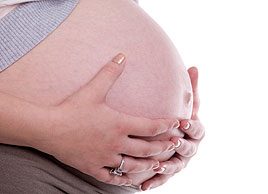Dealing with constipation during pregnancy
Improving your diet and exercise habits can help the symptoms and pain of constipation during pregnancy

Constipation during pregnancy occurs in 40 percent of pregnant women, predominantly during the first and third trimesters. You might be thinking, Stretch marks, swollen feet, and now I have to add constipation to my list of pregnancy pains? It’s not remotely glamorous, but constipation during pregnancy is common. And unlike pregnancy eating habits, which are entertaining to discuss with curious acquaintances and friends who have been pregnant, talking about constipation remains an embarrassing topic.
Here are simple, natural ways to relieve and prevent constipation during pregnancy without resorting to the drugstore shelf, with advice from naturopathic doctor Kathryn Nobrega-Porter, president of Toronto’s Wellpath Clinic.
The basics
In early pregnancy, constipation occurs because the body has created more progesterone, which in turn slows digestion in the intestines. In fact, it’s actually considered one of the first symptoms of pregnancy. Later on, you can count on pregnancy hormones and baby’s increasing size in your uterus to put pressure on your digestive organs, causing constipation and even heartburn. Plus, if your eating habits include eating more potato chips than fibre-packed fruit, you can count on that to exacerbate the problem.
Like so many health conditions, the best cure really is no cure at all. It’s prevention. Try to ward off pregnancy-related constipation by improving your eating and exercise habits. No matter which week of pregnancy you’re in, it’s never too late to get healthier.
Be active
‘Maintain activity,’ encourages Nobrega-Porter. There is a mistaken assumption that being active means hitting the gym. You needn’t take up a step aerobics class to feel the benefits of exercise, particularly when you start to get big. ‘A 30-minute brisk walk most days can help prevent and relieve constipation,’ Nobrega-Porter says.
Eat better
‘Enjoy fruits, vegetables and whole grains, to make sure you are getting enough fibre,’ says Nobrega-Porter. Chances are you already know which fruits and veggies provide fibre, but are you eating them? Be sure to bring high-fibre snacks to munch on at work. If you have appropriate food-storage space, consider bringing a week’s worth of food to the office on Mondays to make sure you always have fresh fruits and vegetables on hand.
Drink more
When you’re deep into enjoying fun activities like shopping or prepping the baby’s nursery, it’s easy to forget to drink enough. Yet making sure you reach for water regularly will help your digestive organs, which are squished by the baby in your ever-expanding tummy, run smoothly. ‘Stay well-hydrated. A general recommendation is two litres of liquids per day,’ says Nobrega-Porter.
Skip the junk
Avoiding processed foods is another of naturopath Nobrega-Porter’s tips. Chocolate cookies made from white flour and sugar are an obvious instance of processed food, but don’t forget to be wary of prepackaged snacks masquerading as a health food.
Go to the toilet when the urge strikes
Unfortunately, the world doesn’t slow down when you’re expecting a baby. There are still last-minute meetings at work, long commutes and a whole host of commitments that will have you rushing around. Though it sounds like common sense, don’t hold off on a washroom visit when nature calls. ‘Never put off going to the bathroom when you feel the urge,’ Nobrega-Porter says. More water gets absorbed from your bowels, which will make your stool harder.
Reconsider your supplements
‘Many women take supplements during their pregnancy and they often contain iron. Sometimes the form of iron used can be constipating,’ says Nobrega-Porter. ‘Check with your health care provider to find the most appropriate support for your body,’ she adds.




